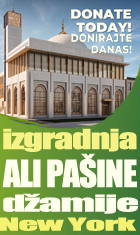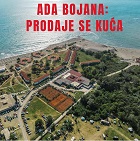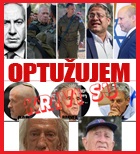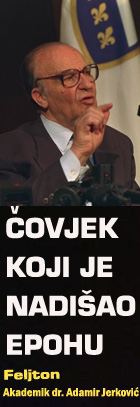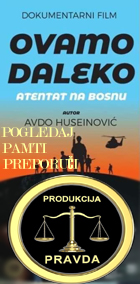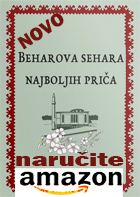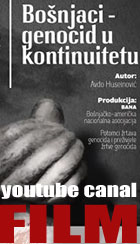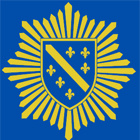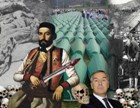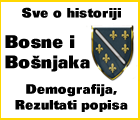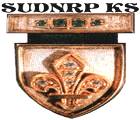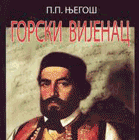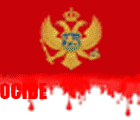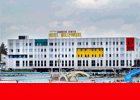
Kolumne
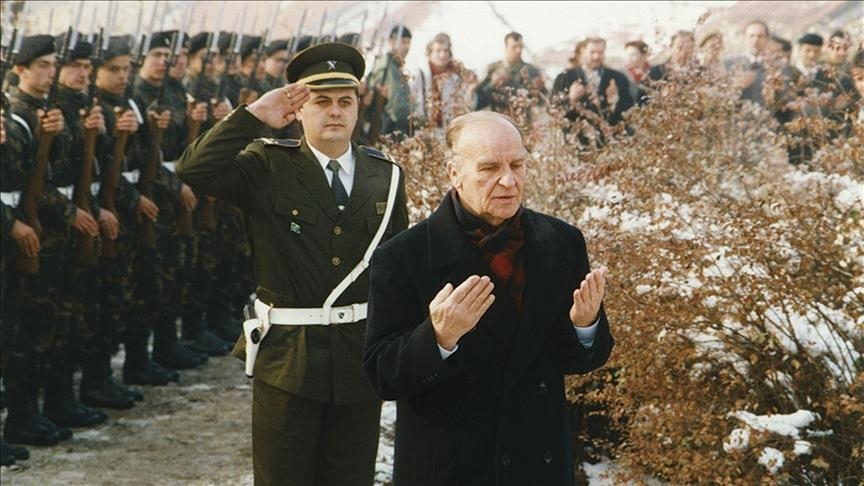
"The role of Alija Izetbegović in the independence of Bosnia and Herzegovina": Izetbegović was born in 1925 in Bosanski Šamac
WHO WAS ALIJA IZETBEGOVIĆ? (7)
Adamir Jerković (Adamir Yerkovich) PhD is a Bosnian-Herzegovinian academic. He is the author of numerous political commentaries. He served as an advisor to the first President of Bosnia and Herzegovina, Alija Izetbegović. He held important political, state and economic posts. Adamir Jerković is the Secretary General of the Bosniak Academy of Sciences and Arts. He is the author of numerous books, essays, and articles.
The state known to millions of people around the world as Socialist Federative Republic of Yugoslavia – does not exist anymore. Yugoslavia burned out in a terrible fire which no one could have extinguished. On its ground, at the ashes of common state, seven new countries emerged. Among them is Bosnia and Herzegovina which revived its statehood. I am coming from Bosnia and Herzegovina and I will tell you today about difficult faith of my people who survived an exterminating war.WHO WAS ALIJA IZETBEGOVIĆ?: President Alija Izetbegović was born in 1925 in Bosanski Šamac, and he grew up in Sarajevo. He finished First Gymnasium for Boys in 1943.
From his earliest youth Izetbegović sought freedom. During the Second World war was persecuted by Ustashas (Croatian fascist formation) because he refused fascistic ideology and he was an opponent to communists. He joined “Young Muslims”, high school and student organization which fought for maintenance of integrity of Muslims.
First time he was arrested in 1946 and he remained in jail for three years. During that time a big number of his comrades were shot, and even bigger number sentenced for multiannual incarcerations.
But that was not the end of his sufferings with communist ideology. Together with another twelve intellectuals, communist government sentenced him in 1983 for his intellectual activities to 14 years of prison in well known Sarajevo process[1] . Izetbegović’s attitude in front of the court was characteristic. He was brave and defiant. He said:
“I loved Yugoslavia, but not its government!“
Sarajevo process raised protests, and Belgrade writers and academics called Yugoslavian justice system “archetype of exemplary punishment for word and thought”. He stayed in prison for five years and then at dusk of communist government, the Assembly of Yugoslavia made in 1988 a decision on amnesty of all prisoners sentenced for verbal offense.
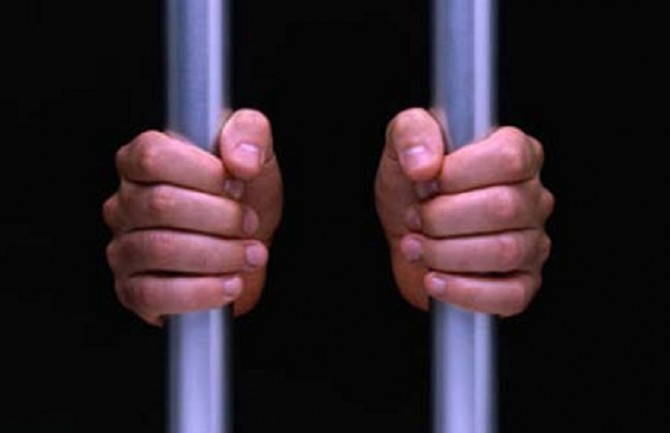 Together with another twelve intellectuals, communist government sentenced him in 1983 for his intellectual activities to 14 years of prison in well known Sarajevo process. Together with another twelve intellectuals, communist government sentenced him in 1983 for his intellectual activities to 14 years of prison in well known Sarajevo process. |
That was a sure hint of the end of socialism. At the horizon a new democratic world appeared, and in the territory of Yugoslavia many recognized the future war. Alija Izetbegović felt tragedy of the situation in which his Muslim people found itself. He got involved in politics and on March 27, 1990 formed Party of Democratic Action[2] , which articulates Muslim national interests. Muslim people, for the first time, got its representative. Muslims were not beheaded as before Second World War which they met barehanded and completely unready. After the fall of Berlin wall, a strong wave of freedom covered the great areas of withered communism, Alija Izetbegović entered the last phase of fight for affirmation of Muslims and establishment of independent democratic Bosnia and Herzegovina. But the path to a final goal was long, very hard and was paid dearly.
In the war for freedom Alija Izetbegović remained unbreakably tied to its people. When he was advised to leave Sarajevo, he refused. Drew in the map of great Serbia, and latter of great Croatia, Bosnia and Herzegovina found itself in jaws of hungry beasts, who threw themselves with unmatched passion to, what they thought was an easy target.
Islamic world gave him Faisal’s Prize[3] , he said:
“Bosnian Muslims are especially killed and persecuted for no other reasons but because they are Muslims. But still they are the winners – because they, despite of everything, hold on in their heroic fight against forces of dark, hate and destruction.”
Aggression to Bosnia and Herzegovina was terrible, rarely brutal and horribly bloody. But Bosnia was not destroyed.
Thanks to Izetbegović’s wise leadership, under whose flag the Army of the Republic of Bosnia and Herzegovina[4] was created and grew, Bosnia and Bosniaks survived never remembered experiment in political theory and practice. Within the orders of the Army, except for Bosniaks there were also Serbs and Croats who were not deceived by Milošević or Tuđman.
FOOTNOTE:
1] The Sarajevo Process (Serbo-Croatian: Sarajevski proces) was a 1983 trial against 13 Muslim intellectuals accused of Islamic fundamentalism. Arrests were made in April 1983, trials held in August 1983. The accused were members of the Young Muslims (Mladi muslimani). Among these were Alija Izetbegović, the author of the essay Islamic Declaration (1970) and later leader of the Party of Democratic Action (SDA) active during the breakup of Yugoslavia, and the first President of Bosnia and Herzegovina. All were sentenced to prison, and were pardoned in 1988.
2] The Party of Democratic Action (Stranka demokratske akcije; abbr. SDA) is a Bosniak political party in Bosnia and Herzegovina.
The Party of Democratic Action (SDA) was founded on 26 May 1990 in Sarajevo, as a "party of Muslim cultural-historic circle". It was a realisation of Alija Izetbegović's idea of an Islamic religious and national party in Bosnia and Herzegovina.
The party has its roots in the old Yugoslav Muslim Organization, a conservative Muslim party in the Kingdom of Yugoslavia. Yugoslav Muslim Organization was a successor of Muslimanska Narodna Organizacija (Muslim National Organization), a conservative Muslim party founded in 1906 during the Austro-Hungarian era. The Muslim National Organization was itself a successor of the conservative Muslim "Movement for waqf and educational autonomy" (Pokret za vakufsko-mearifsku autonomiju) that goes back to 1887.
The SDA achieved considerable success in elections after the breakup of Yugoslavia in the early 1990s. The party remains the strongest political party among the Bosniak population in Bosnia and Herzegovina.
In November 2000 the party was defeated by the Social Democratic Party and other parties gathered into the "Alliance for Change", and found itself in opposition for the first time since its creation. After the 2022 general election, the SDA became once again the largest party in Bosnia and Herzegovina.
The party has branches in Slovenia, Kosovo, North Macedonia, Croatia and the Sandžak region of Serbia. One of the goals of the party, outside Bosnia and Herzegovina, is to represent and defend the interests of Bosniaks and other Muslim South Slavs in the entire Balkan region. The party is an observer member of the European People's Party (EPP). On foreign stances they also tend to be atlanticist and supportive of the accession of Bosnia and Herzegovina to NATO and the European Union.
3] The King Faisal Prize was established in 1977. The prize was granted for the first time in 1979 in three categories: Service to Islam, Islamic studies and Arabic language and literature. Two additional categories were introduced in 1981: Medicine and science.
4] The Army of the Republic of Bosnia and Herzegovina was the military force of the Republic of Bosnia and Herzegovina established by the government of Bosnia and Herzegovina in 1992 following the outbreak of the Bosnian War. Following the end of the war, and the signing of the Dayton Peace Agreement in 1995, it was transformed into Army of the Federation of Bosnia and Herzegovina. Under the State Defense Reform Law the Armed Forces of Bosnia and Herzegovina were unified into a single structure OSBiH making entity armies defunct.
Dossier: THE ROLE OF ALIJA IZETBEGOVIĆ IN THE INDEPENDENCE OF BOSNIA AND HERZEGOVINA
» ALIJA IZETBEGOVIĆ WAS ANTIPODE TO MACHIAVELLI (10)
Akademik prof. dr. Adamir Jerković | 19.08.2023 19:23
Akademik prof. dr. Adamir Jerković | 19.08.2023 19:23
» A MYTHICAL HERO FROM A BLOODY EPOPEE FROM THE END OF 20TH CENTURY (8)
Akademik prof. dr. Adamir Jerković | 08.08.2023 19:23
Akademik prof. dr. Adamir Jerković | 08.08.2023 19:23
» TUĐMAN DID NOT HIDE THAT HE WANTED TO SHARE BOSNIA AND HERZEGOVINA (5)
Akademik prof. dr. Adamir Jerković | 22.07.2023 17:17
Akademik prof. dr. Adamir Jerković | 22.07.2023 17:17
» WE SWEAR BY GREAT GOD THAT WE WILL NOT BE SLAVES (3)
Akademik prof. dr. Adamir Jerković | 16.07.2023 15:55
Akademik prof. dr. Adamir Jerković | 16.07.2023 15:55
» THE ROLE OF ALIJA IZETBEGOVIĆ IN THE INDEPENDENCE OF BOSNIA AND HERZEGOVINA (1)
Akademik prof. dr. Adamir Jerković | 13.07.2023 03:35
Akademik prof. dr. Adamir Jerković | 13.07.2023 03:35
|
Ostali prilozi:
» MJERA LJUDI: MUHAMMAD ALI, BOB VYLAN I TERET SAVJESTI U DOBA BARBARSTVA
Dr. Mustafa Cerić, reisu-l-ulema (1993 - 2012) | 01. July 2025 17:22
» ZOHRAN MAMDANI I POBJEDA DEMOKRACIJE: AMERIČKA POLITIKA, MOĆ I PROMJENE
Dr. Mustafa Cerić, reisu-l-ulema (1993 - 2012) | 27. June 2025 20:46
» ŽIVIMO LI DANAS U VRIJEME DEDŽALA?
Dr. Mustafa Cerić, reisu-l-ulema (1993 - 2012) | 26. June 2025 20:46
» ZOHRAN MAMDANI - KAD NEČIJA HIDŽRA EFEKTUJE JEDAN OD NAJVEĆIH SVJETSKIH GRADOVA
Hfz. mr. Muriz ef. Mešić | 26. June 2025 15:27
» IRAN JE DOBIO OBAVJEŠTAJNI RAT PROTIV IZRAELA
Akademik prof. dr. Adamir Jerković | 25. June 2025 19:42
» ŠTA JE TAJ HDZ I NJEGOVI KADROVI OD ČOVIĆA DO GALIĆA?
Mr. Milan Jovičić, mostarski Sarajlija, Bosanac | 25. June 2025 19:02
» VRIJEME SMISLA: POZIV NA POKRET I JEDINSTVO UMMETA
Dr. Mustafa Cerić, reisu-l-ulema (1993 - 2012) | 24. June 2025 00:34
» SAD I IZRAEL SU ŽELJELI SRUŠITI ISLAMSKI REŽIM U IRANU
Akademik prof. dr. Adamir Jerković | 24. June 2025 00:07
» GRANICE, BIBLIJE I BOGOHULJENJE: KOMENTAR NA ISLAMOFOBIČNU RETORIKU AVI LIPKINA
Dr. Mustafa Cerić, reisu-l-ulema (1993 - 2012) | 20. June 2025 21:37 |
Ostali prilozi istog autora:
|



